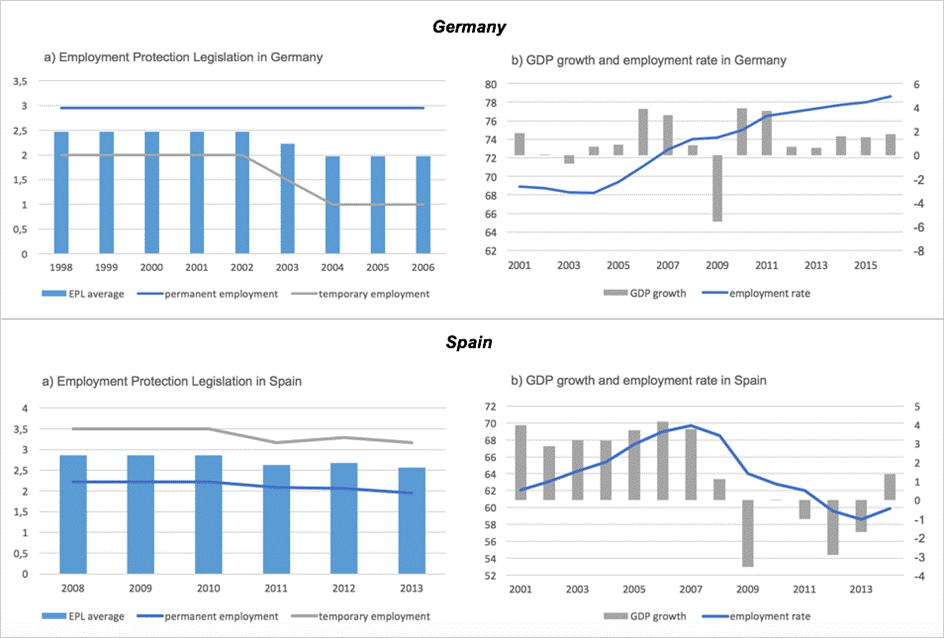Dustin Voss of the London School of Economics investigates the politico-economic origins of populism in his latest LEQS working paper. Comparing Germany and Spain, he notes that populism as a distinct form of protest voting has its roots in perceived labour market inequalities and he argues that sustained flexibilisation and casualisation in low-wage sectors stokes political outrage. In order to counter populist clamour, therefore, social democratic parties and unions must readdress the justifiable grievances of their formerly core electorate.
The nature of populism is truly mercurial. On the one hand, such movements are currently sprouting all over political arenas, stirring intense unrest, instability, and conflict in Eastern and Southern Europe, across the Alps and over the Atlantic. But, on the other hand, while populism is certainly no longer a peripheral phenomenon – in fact, it’s been around as a political strategy for decades – there is considerable disagreement over its origins and the causes of its multifarious manifestations. What’s more, this conceptual confusion often turns the notion itself into a polemical label, with the label ‘populist’ lazily attached to any half-way media-savvy politician.
To bring some order to the debate, I suggest a narrower definition of populism comprising three necessary components: anti-elitism, anti-pluralism and – its most salient feature – the pivotal demand of regaining political agency to remedy the electoral frustration of an allegedly silent majority of neglected voters.
Now, what could explain the recent rise of populists and their so very different political orientations? Recent findings suggest that right-wing populism and protectionist demands tend to emerge in societies subject to large-scale immigration with a large number of economically deprived voters, in other words the ‘losers of globalization’ (Kriesi et al., 2006). But actual country comparisons put these assumptions into question. For example, although Spain largely fulfils these conditions, conditions prevailing there produced a left-wing populist alternative (Podemos), while Germany – Europe’s economic powerhouse – struggles under the recent entry into parliament of the Alternative für Deutschland’s (AfD) as the country’s main opposition party.
Fig. 1. Labour market segmentation and the demand for populism
Put simply, if a group of underrepresented workers is not sufficiently numerous to be electorally-relevant, right-wing populist protest parties can make use of the ensuing representational vacuum. Often this is achieved by reframing class-distributional issues along cultural conflict lines to forge electorally-powerful coalitions with more affluent, but equally fearful, middle-class voters. If, however, the group of marginalised workers is large enough to mobilise broad political attention, left-wing populist parties can, and will, address socio-economic issues of a larger voter base more directly.
A brief look at the political consequences of German and Spanish labour market reforms confirms these assumptions. In Germany, the Hartz reforms of 2003-2005 that were centred around flexibility and retrenched unemployment support produced very divisive outcomes. While the reforms (allegedly) improved employment numbers and are often referred to as the most important reason for Germany’s resilience during the Euro crisis, they also turned out to be highly segmenting and rendered a collective experience of the socio-economic predicament of marginalised labour effectively impossible.
In stark contrast, the Spanish labour market reforms of 2010 and 2012 embodied similar ambitions to Germany’s but produced very different results. Reduced demand and output due to both, externally-imposed austerity and comprehensive wage cuts, led to quick and strong reductions in employment. When restrictions were loosened, Spanish companies immediately took the chance to lay off permanent workers rather than sharing working hours or increasing part-time work to prevent dismissals. So, ultimately, the reforms affected both groups – formerly protected insiders and temporary employees who, together, formed an exceptionally broad social bloc with large voter potential (see Fig. 2. below).
Fig. 2 EPL and GDP growth rates in Germany and Spain
Keynesian and rather cosmopolitan left-wing movement while, in Germany, a smaller number of relatively deprived workers were targeted by a far-right populist party with an anti-pluralist agenda. Here, no collective experience of socio-economic hardship was palpable and the AfD was able to frame political protest along issues of migration and labour competition, abuse of the welfare system, and internal (in)security.
There’s a great deal of irony in these findings. Supposedly successful labour market reforms in Germany created a resilient economy and yet stirred severe political unrest and social instability, while the consequences of Spain’s unsuccessful efforts were also radicalising, but politically and culturally less detrimental in general. Furthermore, this analysis emphasises that, although, anti-pluralist sentiments are a real threat to democracy and unjustifiable, irrespective of one’s socio-economic background, populist demand, if analysed thoroughly, can also serve as an effective ‘alarm signal for dysfunction in the representative political system’ (Cuperus, 2003: 106) and as an indicator of political underrepresentation.
In this light, a constructive approach to tackling populism must rediscover the power and efficacy of labour market institutions in mitigating the adverse effects of structural economic and social transformations, and puts the European left and its social partners under significant pressure to act. In particular, this should entail formulating a distinct alternative to the ever prominent notion of internal devaluation and a reduction of employment protection as the best means of addressing lack of flexibility and rising dualisms in European labour markets.
References:
Cuperus, René (2003): ‘The Populist Deficiency of European Social Democracy’, International Politics & Society 3(2003): 83-109.
Kriesi, Hanspeter, Edgar Grande, Romain Lachat, Martin Dolezal, Simon Bornschier and Thimotheos Frey (2006): ‘Globalization and the transformation of the national political space: Six European countries compared’, European Journal of Political Research 45: 921-956.
Thelen, Kathleen (2014): Varieties of Liberalization and the New Politics of Social Solidarity. New York, NY: CUP.
Dustin Voss is an entering PhD student in the European Institute of the London School of Economics.






